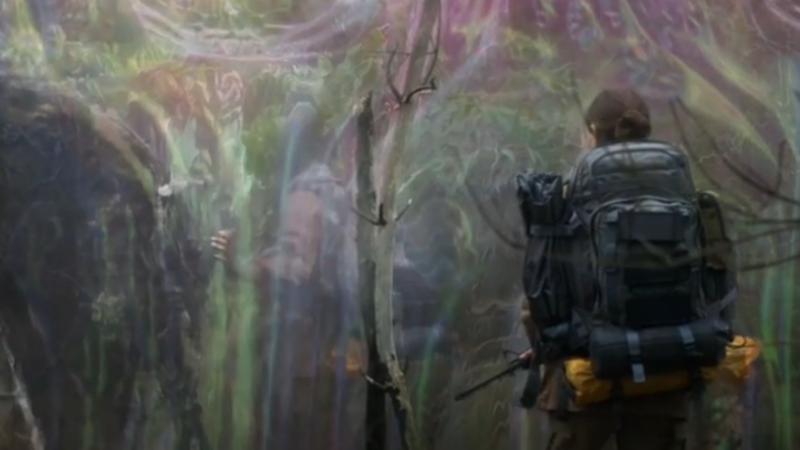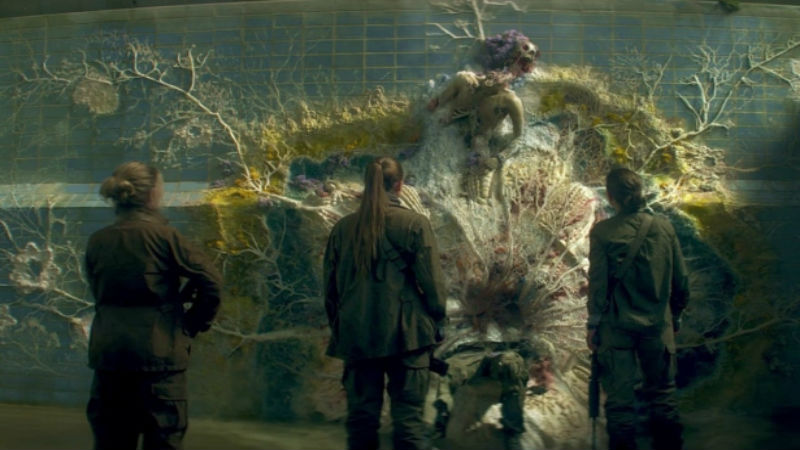Fifty-three-year-old British director of meditative, Tarkovsky-esque sci-fi Annihilation (2018) has given up his more artistic and reflective qualities in favour of a commercial, formulaic and predictable film entirely devoid of social and political undertones. Civil War portrays a near future when the Unites States have broken down. Secessionists have taken control of Texas and California, and other rebel groups are steadily making gains elsewhere. The country is crumbling to pieces. The objective of the breakaway forces is to reach Washington and murder the serving Potus (played by Nick Offerman), an unscrupulous politician now on his third term.
While not marketed as a “post-apocalyptical” film, Civil War is indeed structured like an entry to the genre. The cities have mostly been deserted, the road are piled with abandoned cars, and a sense of hopelessness and impotence prevails. What could be worse than an American president being killed? Surely the end is nigh. The world of Americans is so neatly confined to their borders this often feels like the end of the world. Or a world war.
Our protagonists are Lee (Kirsten Dunst) and Joel (Wagner Moura), two Reuters journalists capturing the implosion of the empire with their lenses. They are supported by Jessie (Cailee Spaeny), an aspiring journalist whom Lee saves from a suicide bombing, and Sammy (Stephen McKinley Henderson), a veteran writer for the New York Times, and some sort of group mentor. In reality, we barely see these people write and conduct interviews, so perhaps it would be more accurate to describe them as photojournalists, The foursome head towards Washington on a mission to interview the president before he falls. Lee explains that she is disillusioned by her job, and thinks that her duty is solely to report, leaving viewers to draw their own conclusions (a very strange notion of journalism, a trade that mandates interpretation and criticism). It is never entirely clear why she forges ahead with what she perceives as a dangerous and pointless job nevertheless. Joel’s sentiments and driving forces are even less clear, in a movie that prioritises action ahead of character development.

They stop at Charlottesville, where the Western Forces of Texas and California are preparing for the final assault and takeover of the White House. It is never clear why Garland, who also penned the film script, chose the sleepy Virginia town for such momentous congregation. This is where the violent white supremacist rallies of 2017 took place (then-president Trump described the marchers as “very fine people”). I have no idea whether the director/scribe is trying to make some sort of political statement. Is he trying to say that the rebels are as dangerous as the racist far-right? Is he suggesting that a self-serving president such Trump or the nameless one here depicted could herald the demise of the United States? Your guess is as good as mine.
The American flag is conspicuous, in a morbid mixture of adulation and decadence. The militants are committed to American nationalism and prepared to shoot anyone who’s foreign-born, in a sheer display of xenophobia. Joel survives by asserting that he was indeed born in “America”, despite a pun about Central and South America (presumably a quip about Wagner Moura’s Brazilian origins). Perhaps the rebels simply wish to re-found the United States rather than establish a brand new nation with a different name? The confusing script leaves this and many other questions unanswered.
Civil War providers viewers with the voyeuristic opportunity to watch the Empire fall to pieces. The pulverisation takes place from West to East, in a movement opposite to the Westward Expansion of the 19th century (when the United States grew its territory through both acquisition and occupation). Smoking fields, piling corpses, unrelenting gunshots, deafening fight jets, parading tanks, constant explosions, mass graves, people casually and sadistically murdered are a scenario familiar to those living in Gaza or perhaps Eastern Ukraine. Americans, on the other hand, have not witnessed any recent conflicts on their immaculate soil. It is shocking to see the perpetrator experience the fate of the victims. This is the utter fetishisation of violence and apocalypse, devoid of any significant socio-political meaning. It gets even worse in the end, when the 109-minute movie lapses into complete bang-bang silliness.
Despite being made an accomplished director from Britain with some arthouse sensibilities, this is just another Hollywood thriller with absolutely nothing to say.
Civil War is in cinemas on Friday, April 12th.










